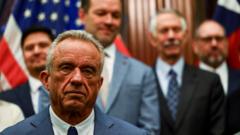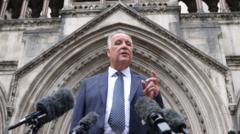Is RFK Jr Putting Americans at Risk? Insights from Former CDC Staff

Published: 2025-09-02 14:35:12 | Category: wales
In a recent open letter, former leaders of the Centres for Disease Control and Prevention (CDC) have expressed grave concerns regarding Health Secretary Robert F. Kennedy Jr.'s policies, which they argue have had a profoundly negative impact on public health in the United States. They highlight his actions—such as restricting vaccines, cutting funding for medical research, and dismissing thousands of healthcare workers—as potentially dangerous to the wellbeing of Americans, particularly children. The letter, published in the New York Times, indicates that Kennedy's tenure has led to alarmingly unprecedented healthcare challenges.
Last updated: 29 October 2023 (BST)
Key Takeaways
- Former CDC leaders criticise RFK Jr. for policies threatening public health.
- His actions include restricting immunisation access and cutting research funding.
- Recent firings and resignations within the CDC have sparked significant concern.
- Critics warn of potential health risks and the risk of another pandemic.
- Kennedy's vaccination scepticism undermines public trust in healthcare.
Background on RFK Jr.'s Tenure
Robert F. Kennedy Jr. was appointed as the Secretary of Health and Human Services (HHS) in early 2023. His appointment was met with mixed reactions, particularly due to his long-standing scepticism regarding vaccines. This scepticism has reportedly influenced his policy decisions, which critics argue could endanger public health.
Policies Under Scrutiny
The open letter reveals a series of controversial policies implemented by Kennedy that have raised alarm among health professionals. Key actions include:
- Restricting Vaccine Access: Kennedy has been accused of slashing support for immunisation programmes, including the global vaccine initiative. This could hinder efforts to prevent infectious diseases.
- Cutting Research Funding: A reported reduction of £500 million in grants related to mRNA vaccine research has left many in the scientific community worried about the future of vaccine development.
- Dismissal of Healthcare Workers: Thousands of healthcare professionals have reportedly been fired, which could have serious ramifications for the healthcare system's capacity and effectiveness.
Consequences of Leadership Changes
The recent firing of Dr. Susan Monarez, a former director of the CDC, has been described as particularly damaging. Monarez was reportedly dismissed for not aligning with Kennedy's policies and for refusing to approve directives that contradicted her professional judgment. Her removal has led to a wave of resignations within the CDC, signalling deep discontent among healthcare professionals.
The Impact of Monarez's Dismissal
Monarez was nominated under the Trump administration and was seen as a stabilising presence within the CDC. Her abrupt removal has been interpreted by many as an attempt to enforce a more compliant leadership aligned with Kennedy's controversial stance on vaccines. Critics argue that this could weaken the CDC's ability to respond effectively to health crises.
Health Risks and Concerns
The former CDC leaders emphasise that Kennedy's policies could jeopardise the health of children and the broader public. Their letter warns that inadequate vaccination coverage can result in outbreaks of preventable diseases. Furthermore, they highlight the potential for such policies to set the stage for another pandemic, echoing fears expressed by public health experts.
The Broader Implications of Vaccine Scepticism
Kennedy's scepticism towards vaccines is not new; he has previously led anti-vaccine advocacy groups and disseminated debunked claims about vaccine safety. This stance has raised concerns about the erosion of public trust in vaccines and health institutions:
- Undermining vaccination efforts can lead to lower immunisation rates.
- Public hesitancy around vaccines can create an environment where infectious diseases can thrive.
- Long-term consequences could include increased healthcare costs and loss of lives.
Current State of the CDC
Under Kennedy's leadership, the CDC has faced significant staffing cuts, with reports indicating that at least 600 employees were let go in August 2023. These cuts have hindered research and response capabilities, particularly regarding infectious diseases and public health emergencies.
Response from the White House
In response to the criticism surrounding Monarez's dismissal, the White House stated that her views were "not aligned" with the current administration's agenda. This remark further fuels apprehension regarding the direction of public health policy under Kennedy's leadership.
What Happens Next?
The future of public health policy in the United States remains uncertain as Kennedy continues his tenure. With growing opposition from health professionals and concerns about the potential impacts of his policies, there is a pressing need for accountability and renewed commitment to evidence-based healthcare practices.
The Role of Public Advocacy
The situation underscores the importance of public advocacy in healthcare. Citizens and professionals alike must engage in dialogue and advocate for policies that prioritise evidence-based health strategies. As the landscape evolves, the need for transparency and adherence to scientific consensus is paramount.
FAQs
What has Robert F. Kennedy Jr. done as HHS Secretary?
Since taking office, Kennedy has implemented policies that restrict vaccine access, cut funding for medical research, and dismissed thousands of healthcare workers, which critics argue could jeopardise public health.
Why was Dr. Susan Monarez fired?
Monarez was reportedly dismissed for refusing to support Kennedy's vaccine policies and for not complying with directives to fire senior staff, which has led to significant unrest within the CDC.
What are the implications of Kennedy's policies on public health?
Kennedy's policies could lead to increased health risks, particularly for children, and may contribute to the resurgence of preventable diseases, potentially setting the stage for future pandemics.
How has the CDC been affected by these changes?
The CDC has faced significant staffing cuts and a reduction in research capabilities, raising concerns about its ability to respond effectively to health crises.
What can the public do in response to these health policies?
Public advocacy is crucial. Citizens are encouraged to engage in discussions about health policies, advocate for evidence-based practices, and support health professionals pushing for accountability.
As the healthcare landscape continues to evolve under Kennedy's leadership, it is vital for citizens to remain informed and engaged. The implications of these policies could have long-lasting effects on public health, and active participation in advocacy may be essential to shaping a healthier future. #PublicHealth #Vaccination #HealthPolicy



